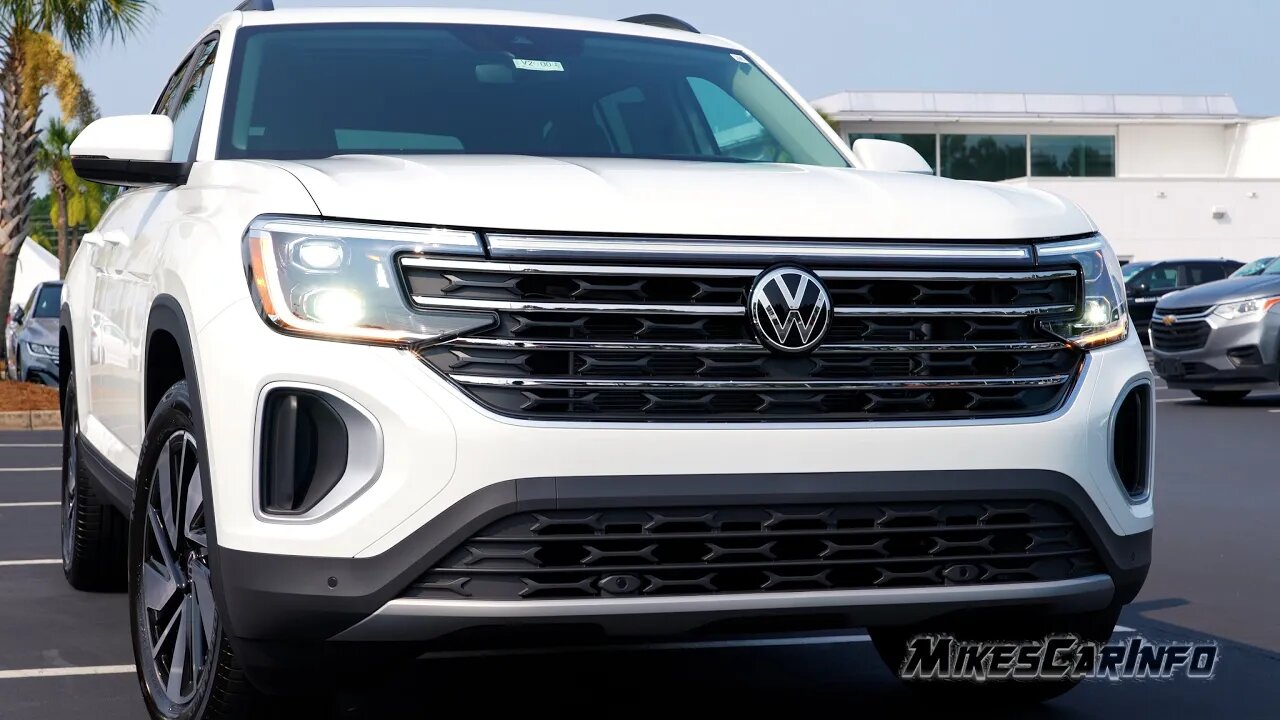Premium Only Content

👉2024 VW ATLAS SE W/Tech -- Detailed Look -- Volkswagen Technology
Special thanks to:
East Coast Volkswagen
http://www.eastcoastvolkswagen.com/
8756-C Hwy 17 Bypass S
Myrtle Beach, SC 29588
Sales: (888) 319-2870
jvincent@eastcoastcars.com
Exterior
Atlas makes a style statement from the front. Outside, model year 2024 brings a new front end design and greater differentiation between Atlas and Atlas Cross Sport.
Headlight designs feature standard full-LED lighting, including low beams, high beams, and Daytime Running Lights (DRLs); taillights are LEDs as well.
Major refresh of Atlas family boasts significant interior upgrade with premium materials and elegant design
Refresh adds standard content, including high-end comfort features like Climatronic®, ventilated front seats, and heated steering wheel, as well as the IQ.DRIVE® suite of driver assistance features
New 2.0-liter turbo powertrain replaces previous four-cylinder and VR6® options, bringing better torque and acceleration than the outgoing engines and improved fuel economy compared to the VR6
Rugged Atlas Peak Edition trimline joins facelifted MY24 Atlas lineup with unique interior and exterior features
MSRP starts at $37,725
Powertrain
All Atlas models are propelled by one of the most advanced Volkswagen engines ever built, the new “Evo4” 2.0-liter four-cylinder TSI® EA888 engine. Producing 269 horsepower and 273 lb-ft of torque with regular fuel—an increase of 34 horsepower and 15 lb-ft over the previous generation four-cylinder engine—it offers similar horsepower and more torque over a broader rev range (1600-4500 rpm) than previous six-cylinder models.
Combining direct fuel injection and turbocharging to balance efficiency and power, modifications to the 1,984 cc Evo4 engine include new fuel injectors along with an increase in injection pressure from 200 bar (2,900 psi) to 350 bar (5,076 psi). Improvements to reduce internal engine friction include a new balancer shaft design that already utilized roller bearings, a narrower oil pump drive chain, a simplified valvegear drive-chain tensioner, and a new throttle valve that reduces air leakage.
On all Atlas models, an eight-speed automatic transmission designed to maximize efficiency sends power to either the front wheels or to all four wheels when equipped with 4Motion with Active Control all-wheel drive. Urban efficiency is aided by start/stop technology, which turns off the engine during idle when the brake pedal is held (such as when waiting at a red light). When the brake pedal is released, the engine restarts.
The majority of Atlas models now offer a towing capacity of 5,000 lbs with a braked trailer. SE with Technology models and above include a trailer hitch as standard. SE models offer a towing capacity of 2,000 lbs with an aftermarket hitch and a braked trailer—hitch preparation is included.
EPA-estimated fuel economy for 2024 models equipped with front-wheel drive is 20/27/23 mpg (city/hwy/combined). For models equipped with the 4Motion all-wheel-drive system, the EPA-estimated fuel economy is 19/26/22 for SE and SE with Technology models, 19/25/21 for SEL and SEL Premium R-Line models, and 18/24/20 for Atlas Peak Edition models.
4Motion All-wheel-drive System
The latest-generation 4Motion with Active Control all-wheel-drive system is designed to activate before wheelspin occurs, helping eliminate traction losses. The system achieves this by using an advanced control function based on specific driving conditions. When operating under a relatively low load or when coasting, the front wheels are driven and the rear wheels are decoupled, a feature designed to help to save fuel. However, the rear wheels can be engaged in fractions of a second whenever necessary via the center differential, which is activated by an electro-hydraulic oil pump.
A control unit continually calculates the ideal drive torque for the rear wheels and controls how much the multi-plate clutch should be closed by activating the oil pump. The oil pressure increases the contact pressure at the clutch plates in proportion to the torque desired at the rear axle. So, the amount of pressure applied to the clutch plates can be used to continuously vary the amount of torque going between the front and rear wheels, up to a maximum of 50 percent at the rear axle.
In addition to the center differential that acts longitudinally, electronic differential locks that are a function of the Electronic Stability Control (ESC) system act laterally. The system can briefly brake a wheel that is slipping, enabling uninterrupted and stable transfer of drive power to the wheel on the opposite side.
Competitive Set
Chevrolet Traverse, Ford Explorer, Honda Pilot, Kia Telluride, Mazda CX-9, Subaru Ascent, Toyota Highlander
music by Karl Casey @White Bat Audio
-
 3:28
3:28
MikesCarInfo
1 year ago $0.01 earnedReplace Battery Nissan Key Fob -- Nissan's New Intelligent Smart Proximity Key FOB
1651 -
 LIVE
LIVE
JuicyJohns
4 hours ago $1.96 earned🟢#1 REBIRTH PLAYER 10.2+ KD🟢$500 GIVEAWAY SATURDAY!
149 watching -
 59:16
59:16
VINCE
4 hours agoThe Kamala Comeback Is Here | Episode 94 - 08/01/25
180K104 -
 LIVE
LIVE
LFA TV
16 hours agoLFA TV ALL DAY STREAM - FRIDAY 8/1/25
4,411 watching -
 1:47:49
1:47:49
Dear America
4 hours agoHILLARY EXPOSED!! New Files Reveal She Was Behind It ALL!!! + Kamala Breaks Silence!!
112K80 -
 1:25:42
1:25:42
The Big Mig™
5 hours agoHillary Clinton & George Soros To GITMO NOW!!!
11.8K13 -
 1:41:12
1:41:12
Badlands Media
8 hours agoBadlands Daily: Aug 1, 2025
50.8K8 -
 2:11:10
2:11:10
Matt Kohrs
12 hours agoTrump Tanks Stocks, Breaking Market News & Payday Friday || Live Trading
49K1 -
 13:42
13:42
China Uncensored
14 hours agoChina's Invasion Has Begun
33.1K26 -
 2:59:23
2:59:23
Wendy Bell Radio
7 hours agoBUSTED
83.1K57